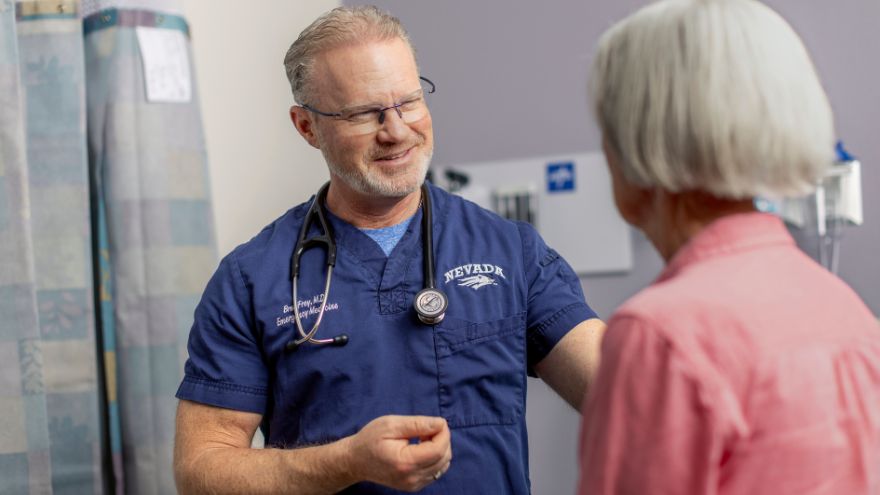Buscar
-
Know when to visit an ER: Top 5 concerns
When a sudden illness or injury occurs, the emergency room (ER) provides immediate medical attention to those in need. Understanding the top reasons for visiting the ER can help people make informed decisions about seeking emergency care. Here are the five most common reasons people in Nevada visited an ER in 2023. 1. Abdominal pain One of the top reasons people visit the ER is abdominal pain. The abdomen has many organs, including the stomach, liver, small and large intestines, gallbladder and pancreas. Significant pain in this area can be a cause of concern. Warning signs of a serious problem include abdominal pain with fever, vomiting, and not being able to move or perform everyday tasks due to pain. Seeking medical attention when experiencing these symptoms is essential. Emergency physicians can perform abdominal exams, assess the condition and rule out significant threats. 2. Fever High fevers that do not get better with medicine and are accompanied by other symptoms can cause concern. This can indicate that the body is fighting off an infection or illness. Fever with symptoms like vomiting, pain, altered mental status, shortness of breath or inability to perform daily functions are warning signs to watch out for. Adults and children should visit an ER, where the team can assess the causes of the fever. 3. Chest pain and shortness of breath Chest pain and discomfort, or pain in the upper body can suggest warning signs of a heart attack. If a person is experiencing signs of a heart attack, call 911 immediately to ensure timely treatment or assessment by a medical professional. Heart attack symptoms include: Chest pain, including pain that can be described as chest pressure, heaviness or squeezing Discomfort in the chest, arms, back, neck, shoulders and jaw Difficulty breathing Sweating with any of the above symptoms When visiting a Renown ER for chest pain, a trained medical professional will promptly perform an Electrocardiogram (EKG) in an area where preliminary assessments, also known as triage, take place. Individuals experiencing shortness of breath or trouble breathing, whether from a respiratory infection, asthma complications or other pre-existing conditions should not ignore symptoms as these can signify more serious issues. Warning signs of respiratory distress may include: A significant change in breathing rate A significant change in the amount of energy used to inhale or exhale when breathing Changing of the skin color to blue, gray or paleness, which can indicate a lack of oxygen Nasal flaring Chest retractions, which can suggest difficulty bringing air into the lungs What this looks like: the chest sinking in just below the neck, breastbone or rib cage while breathing 4. Neurological symptoms Sudden and severe headaches or seizures may prompt individuals to visit the ER if symptoms are extremely disorientating or debilitating. These symptoms could be indicative of various conditions, including strokes or neurological disorders that require prompt evaluation. If a person is experiencing signs of stroke, call 911 immediately to ensure timely treatment. Stroke symptoms include: Numbness, weakness or loss of movement in the face, leg or arm, especially on one side Confusion, including trouble speaking or understanding Trouble with vision or loss of balance When choosing emergency care for signs and symptoms of stroke, a Comprehensive Stroke Center can provide patients with immediate intervention, including evaluation, treatment and education. 5. Cough/flu-like symptoms Emergency departments are staffed by medical professionals trained to prioritize and treat emergency and trauma situations. Receiving care at an ER should be reserved for severe symptoms and life-threatening conditions. It’s best to schedule a visit with a primary care physician for mild cold and flu symptoms. Most urgent care locations are equipped with rapid testing options, including RSV, COVID-19, influenza, mononucleosis, urinary issues and strep throat. It is critical to distinguish between common respiratory infections and more severe cases, such as pneumonia or complications from the flu. Symptoms that may warrant a visit to the ER include: Rapid decline in the ability to perform regular daily activities Coughing or throwing up blood Severe dehydration and inability to drink fluids High fever not responsive to medication Understanding top ER visits in Nevada While these ER complaints are common reasons for emergency room visits in Nevada, it's important to remember that emergency care is available for all immediate medical needs. Do not hesitate to seek help at an emergency room if someone experiences a sudden or severe health concern. Quick and appropriate action can make a significant difference in keeping you and your loved ones healthy. Renown Health is the largest locally governed, not-for-profit healthcare network in northern Nevada, providing leading emergency and trauma care by board-certified emergency physicians 24/7 at three locations, including the region’s only pediatric emergency department. Renown Health emergency rooms prioritize swift assessments, advanced diagnostic tools and compassionate care, providing leading emergency and trauma care. Trust Renown ER for not just emergency care but exceptional care. Learn more at renown.org/ER.
-
3 Reasons to Choose a Senior Care Plus Health Plan
Senior Care Plus was Nevada’s first Medicare Advantage Plan and is still providing healthcare coverage to qualifying members in Washoe, Carson City, Clark & Nye Counties. Senior Care Plus is administered by Hometown Health, the insurance division of Renown Health. That relationship means Senior Care Plus is the only Medicare Advantage Plan supported and accepted at Renown. This preferred access to Renown is a great benefit for northern Nevadans. When it comes to healthcare coverage, there are three key factors to keep in mind. Here’s why a Senior Care Plus Medicare Advantage Plan is your best choice. 1. Cost Cost matters when searching for the right insurance plan. Of the four Senior Care Plus plans available to residents of Washoe County and Carson City, three offer a zero-dollar monthly premium and all of them offer zero-dollar primary care office visits. That means no out-of-pocket costs for you. Additionally, all Senior Care Plus plans have an annual out-of-pocket maximum. This means when you reach this amount, that’s all you will pay. Senior Care Plus pays all other covered medical benefits for the rest of the year. That’s the beauty of a Senior Care Plus Medicare Advantage Plan. 2. Size of Provider Network and Accessibility Although saving money is important, it’s more important to be able to see a doctor when and where you need to. Senior Care Plus members enjoy the most comprehensive healthcare provider network in the region. Thousands of providers, including many hard-to-find specialists, are in the Senior Care Plus network. Since Senior Care Plus is part of the Renown Health family, you get priority access to all that Renown has to offer, which you won’t find with any other Medicare Advantage Plan. 3. Coverage Medical coverage needs are personal and unique to every member. Understanding a plan’s benefits is essential when picking the best coverage for you. Of course, the important benefits you associate with a healthcare plan are included in all Senior Care Plus plans: urgent care visits, specialists’ visits, lab services, imaging — all with reasonable copays. What sets Senior Care Plus apart from the rest are the additional benefits for preventive health. For example, Senior Care Plus offers plans with a comprehensive dental benefit with first-dollar coverage, meaning you pay nothing until the benefit limit is reached. Senior Care Plus Medicare Advantage Plans also have a vision benefit allowing you to get a new pair of eyeglasses every year. In addition, these plans offer a fitness benefit, so you can join a local gym because Senior Care Plus wants to keep you healthy. Another interesting benefit is the over-the-counter benefit. If you choose the Renown Preferred Plan, you can select $50 worth of over-the-counter products such as: cold medicine, dental products, diabetic supplies, and digestive aides. Remember, that’s $50 worth of over-the-counter products four times per year. All on a plan that doesn’t cost a thing. Senior Care Plus Medicare Advantage Plans offer many added benefits tailored to Nevadans.
Read More About 3 Reasons to Choose a Senior Care Plus Health Plan
-
5 Benefits of Medicare Advantage Plans
If you are approaching age 65, you may be starting to think about the government benefits you will soon qualify for. For example, your healthcare option to elect between Original Medicare or a Medicare Advantage plan. What’s the difference? Original Medicare comes in two parts: Part A and Part B. Part A covers a portion of hospitalization expenses, and Part B applies to doctor visits and medical expenses, such as lab tests and some preventative screenings. A Medicare Advantage plan, also known as Part C, is an “all-in-one” alternative to Original Medicare. These “bundled” plans include the benefits of Part A, Part B and Part D (prescription drugs). Some people choose a Medicare Advantage Plans over Original Medicare because these plans offer coverage like vision, hearing, dental and more. Saves You Money First and foremost, Medicare Advantage Plans save Medicare members money –and not just a little bit of money, but a lot of money. Original Medicare only pays 80% of the cost of medical care – the Medicare beneficiary is responsible for the other 20%. A Medicare Advantage Plan is different. The Medicare Beneficiary is only responsible for a small copay, typically less than 20% of a doctor visit or procedure. More importantly, Medicare Advantage Plans have a maximum out-of-pocket amount, meaning that once you reach the limit, the Plan pays 100% of all medical services. That alone can save thousands of dollars per year – particularly if there is a hospitalization involved. Dental, Vision and Hearing Coverage What sets Medicare Advantage plans apart is the additional benefits provided that Original Medicare doesn’t cover. These benefits include dental coverage, vision coverage, hearing exams and hearing aid coverage. None of these important health care benefits are included in Original Medicare. Also, most Medicare Advantage Plans include prescription drug coverage at no additional cost, while individuals with Original Medicare need to sign-up and pay extra for Part D prescription drug coverage. Medicare Advantage Plans offer more benefits than Original Medicare and they help members save on their health care costs. Focus on Accessibility, Wellness and Preventative Health Accessible healthcare coverage is key to staying on top of your health. To join a Medicare Advantage Plan you must have Part A and Part B coverage and live in the plan’s service area. It is important to remember that Original Medicare is only valid in the United States. Fortunately, many Medicare Advantage Plans offer worldwide emergency coverage. Another important healthcare consideration to keep in mind is Medicare Advantage Plans focus on your overall well-being. They offer preventative and wellness-related benefits at no cost to you. This includes important benefits like free over-the-counter medicines and free gym memberships. You won’t find those types of benefits with Original Medicare. Medicare Supplement Plans (Medigap) Some people confuse a Medicare Supplement Plan, also known as a Medigap Plan, with Medicare Advantage Plans. They are different and the biggest difference is Medicare Supplement plans come with ever-increasing premiums because they are based on your age. This means the cost of these plans increase every year. Plus, they don’t offer any supplemental benefit coverage like vision, dental or hearing. That’s not the case with a Medicare Advantage Plan. In many cases, there is no monthly premium and you receive all manner of supplemental benefits. These benefit-rich, zero-dollar premium Medicare Advantage plans are enticing people to say goodbye to pricy Medicare supplement plans and hello to Medicare Advantage Plans. Don’t worry, if you join a Medicare Advantage Plan for the first time and you aren’t happy with the plan, you’ll have special rights under federal law to buy a Medigap policy and a Medicare drug plan if you return to Original Medicare within 12 months of joining the Medicare Advantage Plan. The Flexibility to Change Your Mind A common misconception about Medicare Advantage Plans is that when you join, you are still on Medicare and are not giving up your Medicare coverage. Medicare Advantage Plans are considered “Medicare Part C.” This means they combine your Medicare Part A (hospital coverage), Part B (doctor’s coverage) and Part D (prescription drug coverage) into one convenient package that costs less and provides more. You can only join, switch or drop a Medicare Advantage Plan during the enrollment periods: Initial Enrollment Period: When you first become eligible for Medicare, you can sign up during your Initial Enrollment Period. For many, this is the seven-month period that begins three months before the month you turn 65, includes the month you turn 65, and ends three months after the month you turn 65. General Enrollment Period: If you have Part A coverage and you get Part B for the first time during this period (between January 1 - March 31 each year), you can also join a Medicare Advantage Plan. Your coverage may not start until July 1. Annual Election Period: Between October 15 and December 7, anyone with Medicare can join, switch or drop a Medicare Advantage Plan. Your coverage will begin on January 1 (as long as the plan receives your request by December 7). Medicare Advantage Plans have been around for more than 25 years and continue to grow in popularity. In some parts of the country, more than half of all Medicare beneficiaries are enrolled in a Medicare Advantage Plan. Only 40% are enrolled here in Nevada, but that number is growing every year.


